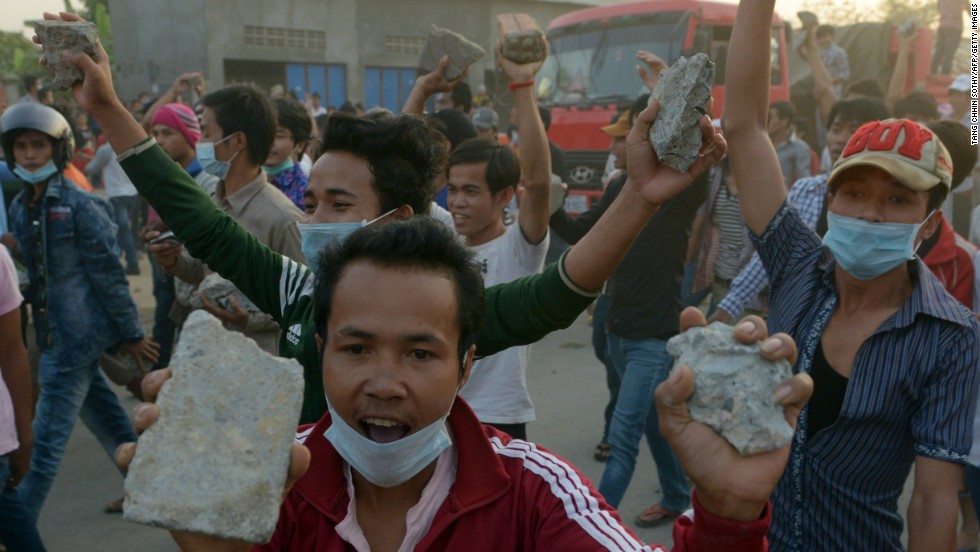Recent developments in Cambodia merit attention as the country’s political leaders appear to be returning to their respective corners in what would be a lengthy lead-up to the national elections in July 2018. If this is what is happening, collateral damage will include the country’s political stability.
In July 2013 Cambodia plunged into a period of political turmoil following the allegedly rigged 2013 elections on top of mass demonstrations by some of Cambodia’s 700,000 garment workers upset over low wage increases that year. The stalemate turned bloody in January 2014 when 4 protestors were killed by police. In July 2014, the Prime Minister’s Cambodia’s People’s Party (CPP) and the opposition, the Cambodian National Rescue Party (CNRP) reached a political truce which ended the opposition’s boycotting of their parliamentary seats and opened dialogue about election reform.

There were always questions about the stability of the political truce and considering the development of recent events, the CPP’s commitment to the truce appears questionable at best. Here is a timeline of the key events leading up to the current situation:
- June 13—The National Assembly adopted a draft law on Associations and Non- Governmental Organizations (NGOs) despite a boycott from the opposition lawmakers and protests by NGOs (who were excluded from participating in the drafting of the law).
- July 21—11 CNRP opposition members and activists were jailed for insurrection for taking part in clashes in July 2014 over the closure of a protest site in the capital. Three received 20-year jail sentences.
- August 3—Prime Minister Hun Sen back-pedals on when the elections will be held. Bumped back from Feb 2018 to July 2018 (or rather from dry season to rainy season when voter turn-out is worse & harder to monitor the elections (due to poor roads)).
- October 26— Two CNRP members of parliament were pulled from their vehicles, kicked and beat by CPP-affiliated youth groups demanding Kem Sokha to resign.
- October 13 — Cabinet approves the controversial draft law aimed to regulate labor organizations leaving in provisions that criminalize some of the work of union leaders and make it harder to form unions.
- October 30 — Removal of vice president of the CNRP Kem Sokha from his position as First Vice President of the National Assembly which appears to be unconstitutional.
- November 16—Ousting of Sam Rainsy from parliament. Court issued an arrest warrant for charges that the Prime Minister has already pardoned him for (in 2013).
- November 25— Kem Sokha returned from Cambodia, along with the two lawmakers who were brutally beaten outside the National Assembly in October.
- November 30—The CNRP seek a meeting with the government to address the above mentioned issues, however, the CPP had replied that it is “too busy”.
In aggregate these developments effectively signal an end to the political truce, at least in practice. At best, it is hanging by a thread. Reestablishing the truce at this point will be politically cumbersome for the prime minister. Even if there was political will to do so, it could be politically difficult to manage without losing face. As such, it is difficult to see there being a course correction and a return to the July 2014 truce.
This steady dialing back of the gains made during the truce was made under a pretense of consequences for “bad behavior” and was in the cards all along. The prime minister is reclaiming what political ground he conceded by corning those that threaten his claim on power—the opposition, labor unions and non-profit organizations. He is therefore laying the groundwork now for a more controlled outcome in 2018, which he knows he is unlikely to win legitimately.
Indeed, the elections are the prize to be won and what is now playing out is the early pull and tug by both the CNRP and the CPP. The opposition knows that if it can gain more equal footing in an election environment it would perform well—the CNRP already controls 45% of the seats in parliament. It is very conceivable for the opposition to gain enough seats for a simple majority. The elections are the only legitimate means they have to gain power. It’s also a more publicized and international event that is more difficult to conceal wrongdoing. For his part, the prime minister is manufacturing the context by which July 2018 delivers the country’s top post to him yet again.
From here, the prime minister is giving CNRP the chance to nominate another one of its lawmakers for first vice president (replacing the vacancy created by the exit of Kem Sokha) though I suspect they will not take it. Behind the scenes there will likely be negotiations playing out in an effort to grant Sam Rainsy amnesty but there seem to be a slim chance of that right now. He may continue to stay overseas to wait out the charges while he seeks clemency like he has in the past. With Sam Rainsy overseas again, with Kem Sokha’s wings clipped, with trade unions and non-profit organizations (defined broadly) also facing pressure, if a political truce cannot be rekindled, Cambodia could be heading for yet another very unstable stretch.
This was first published on the Southeast Asia Insider, Cascade Asia’s official blog.
